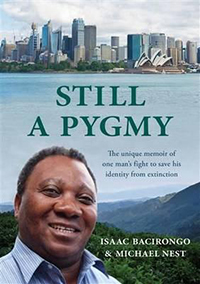Still a Pygmy
 Still a Pygmy, by Isaac Bacirongo & Michael Nest, is the memoir of Isaac Bacirongo, an ethnic BaTembo Mbuti (Pygmy) from eastern Democratic Republic of Congo. This recent library acquisition is thought to be the first memoir by a Pygmy author ever to be published. His narrative is recorded by Michael Nest, an Australian writer who also lived in the DR Congo for years. They met in Sydney and their shared interest in Congolese politics and culture grew into this collaboration.
Still a Pygmy, by Isaac Bacirongo & Michael Nest, is the memoir of Isaac Bacirongo, an ethnic BaTembo Mbuti (Pygmy) from eastern Democratic Republic of Congo. This recent library acquisition is thought to be the first memoir by a Pygmy author ever to be published. His narrative is recorded by Michael Nest, an Australian writer who also lived in the DR Congo for years. They met in Sydney and their shared interest in Congolese politics and culture grew into this collaboration.
Marginalization
Nest records at first Bacirongo’s childhood which is spent in the forest of Eastern Congo, following traditional forest life as a member of one of a marginalized minority group. Centuries of oppression have taught the Pygmies to hide their identity in a place where they are considered inferior and fit only to become slaves.
Education
He surmounts incredible odds in his pursuit of going to school, such as raising chickens in order to pay his school fees, and then he tells Nest that his parents start eating his chickens because for them daily food was more important than a future investment. He marries a ‘city girl’ against the wishes of his mother who complains the girl can’t gather or fish, and settles in the town centre of his region, starting a small business to support himself. As his business grows and his family grows, he decides to move to the big city of Bukavu, a challenging move because of his inferior status as a pygmy in the eyes of other ethnic groups.
Refugee in Australia
Although he faces resistance from other pygmies, who are reluctant to speak out for fear of persecution, he becomes an advocate for fair treatment of his people and helps establish the first indigenous rights organization for pygmies in Congo. Then tensions spill over from Rwanda’s civil war with its racial hate, and he is punished for his human rights activism by the rebel regime that occupied the area from 1998 to 2003. However, the whole family manage to escape to Nairobi, Kenya, later registering as refugees with UNHCR; they are resettled as refugees in Australia. This presents its own challenges of learning to live in another new environment with a completely different language, culture, and living conditions from what they are used to.
In their backyard in a suburb of Sydney Isaac and his wife Josephine plant a banana tree and also grow African vegetables. “It’s my connection to my homeland.”
“I hope my memoir will make Pygmies proud of their identity and make other people understand Pygmies are also world citizens with the same capabilities as anyone.”
Angela Robson
The ASCL Library has more than 200 publications (books and articles) on Pygmies.

